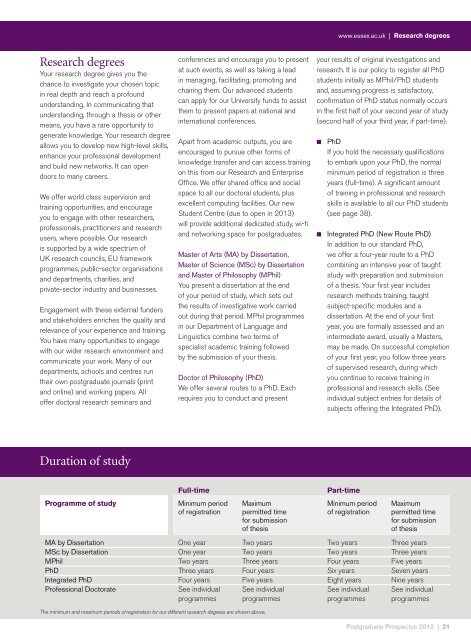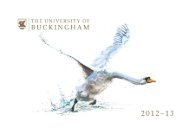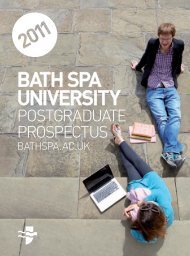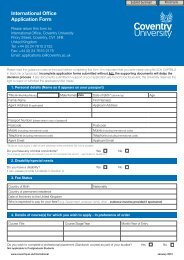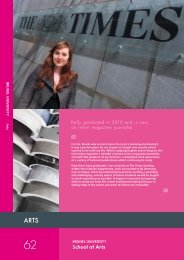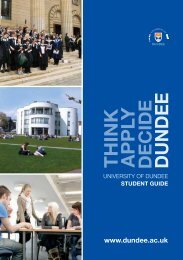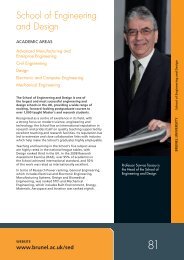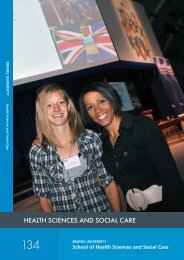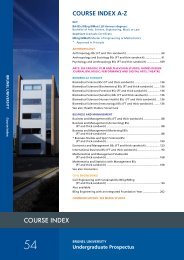Postgraduate Prospectus
Postgraduate Prospectus
Postgraduate Prospectus
You also want an ePaper? Increase the reach of your titles
YUMPU automatically turns print PDFs into web optimized ePapers that Google loves.
www.essex.ac.uk | Research degrees<br />
Research degrees<br />
Your research degree gives you the<br />
chance to investigate your chosen topic<br />
in real depth and reach a profound<br />
understanding. In communicating that<br />
understanding, through a thesis or other<br />
means, you have a rare opportunity to<br />
generate knowledge. Your research degree<br />
allows you to develop new high-level skills,<br />
enhance your professional development<br />
and build new networks. It can open<br />
doors to many careers.<br />
We offer world class supervision and<br />
training opportunities, and encourage<br />
you to engage with other researchers,<br />
professionals, practitioners and research<br />
users, where possible. Our research<br />
is supported by a wide spectrum of<br />
UK research councils, EU framework<br />
programmes, public-sector organisations<br />
and departments, charities, and<br />
private-sector industry and businesses.<br />
Engagement with these external funders<br />
and stakeholders enriches the quality and<br />
relevance of your experience and training.<br />
You have many opportunities to engage<br />
with our wider research environment and<br />
communicate your work. Many of our<br />
departments, schools and centres run<br />
their own postgraduate journals (print<br />
and online) and working papers. All<br />
offer doctoral research seminars and<br />
conferences and encourage you to present<br />
at such events, as well as taking a lead<br />
in managing, facilitating, promoting and<br />
chairing them. Our advanced students<br />
can apply for our University funds to assist<br />
them to present papers at national and<br />
international conferences.<br />
Apart from academic outputs, you are<br />
encouraged to pursue other forms of<br />
knowledge transfer and can access training<br />
on this from our Research and Enterprise<br />
Office. We offer shared office and social<br />
space to all our doctoral students, plus<br />
excellent computing facilities. Our new<br />
Student Centre (due to open in 2013)<br />
will provide additional dedicated study, wi-fi<br />
and networking space for postgraduates.<br />
Master of Arts (MA) by Dissertation,<br />
Master of Science (MSc) by Dissertation<br />
and Master of Philosophy (MPhil)<br />
You present a dissertation at the end<br />
of your period of study, which sets out<br />
the results of investigative work carried<br />
out during that period. MPhil programmes<br />
in our Department of Language and<br />
Linguistics combine two terms of<br />
specialist academic training followed<br />
by the submission of your thesis.<br />
Doctor of Philosophy (PhD)<br />
We offer several routes to a PhD. Each<br />
requires you to conduct and present<br />
your results of original investigations and<br />
research. It is our policy to register all PhD<br />
students initially as MPhil/PhD students<br />
and, assuming progress is satisfactory,<br />
confirmation of PhD status normally occurs<br />
in the first half of your second year of study<br />
(second half of your third year, if part-time).<br />
n<br />
n<br />
PhD<br />
If you hold the necessary qualifications<br />
to embark upon your PhD, the normal<br />
minimum period of registration is three<br />
years (full-time). A significant amount<br />
of training in professional and research<br />
skills is available to all our PhD students<br />
(see page 38).<br />
Integrated PhD (New Route PhD)<br />
In addition to our standard PhD,<br />
we offer a four-year route to a PhD<br />
combining an intensive year of taught<br />
study with preparation and submission<br />
of a thesis. Your first year includes<br />
research methods training, taught<br />
subject-specific modules and a<br />
dissertation. At the end of your first<br />
year, you are formally assessed and an<br />
intermediate award, usually a Masters,<br />
may be made. On successful completion<br />
of your first year, you follow three years<br />
of supervised research, during which<br />
you continue to receive training in<br />
professional and research skills. (See<br />
individual subject entries for details of<br />
subjects offering the Integrated PhD).<br />
Duration of study<br />
Full-time<br />
Part-time<br />
Programme of study Minimum period Maximum Minimum period Maximum<br />
of registration permitted time of registration permitted time<br />
for submission<br />
for submission<br />
of thesis<br />
of thesis<br />
MA by Dissertation One year Two years Two years Three years<br />
MSc by Dissertation One year Two years Two years Three years<br />
MPhil Two years Three years Four years Five years<br />
PhD Three years Four years Six years Seven years<br />
Integrated PhD Four years Five years Eight years Nine years<br />
Professional Doctorate See individual See individual See individual See individual<br />
programmes programmes programmes programmes<br />
The minimum and maximum periods of registration for our different research degrees are shown above.<br />
<strong>Postgraduate</strong> <strong>Prospectus</strong> 2012 | 21


